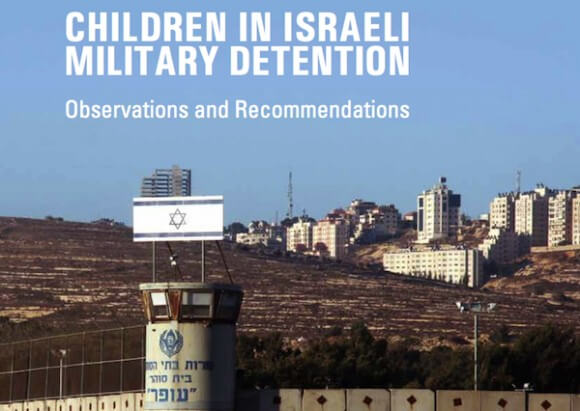Allegedly Israel will be reforming the way it arrests children in the West Bank. At least that’s what we’re led to believe by AFP‘s Israel army reforms child arrest methods, The United Nations Children’s Fund (UNICEF) announced on Monday the Israeli military “agreed to test alternative treatment.” They won’t arrest them in the middle of the night.
But does that mean they truly will cease hauling them off in the middle of the night? Probably not. According to Haaretz, this is a “pilot-test” program “in two unspecified regions”of the West Bank– and it comes as a surprise to “officers who are involved.”
According to the latest statement, in September the IDF Central Command agreed to pilot-test a new approach in two unspecified regions of the West Bank. Instead of arresting children wanted for questioning at their homes at night, any such arrests will take place during daylight hours.
But Haaretz has learned that this policy has yet to be implemented, and the UNICEF announcement was a surprise to officers who are involved. According to military sources, the Central Command and MAG are still drafting the pilot program. The IDF Spokesman’s Office declined to provide details of the change in policy, saying only that the program is being examined by the relevant officials.
What a novel idea– not abducting children from their homes in the middle of the night. AFP reports that the measures being tested include the Israeli military issuing a summons for the child instead of arresting them at night at their homes. But it doesn’t preclude the summons being hand-delivered in the middle of the night.
Excuse my reluctance to get excited here, but: how about not arresting children?
This follows UNICEF’s “first progress report” issued Monday listing recommendations from its earlier damning report from last March Children in Israeli Military Detention, Observations and Recommendations (pdf), chronicling “widespread, systematic and institutionalized” abuse of Palestinian children held in Israeli custody. We covered UNICEF’s report here, as well as a subsequent report on a bizarre press conference that took place in Jerusalem last April in which it appeared there was an attempt by UNICEF to stifle their own findings.
A reminder of those findings from AFP:
UNICEF’s March report, entitled “Children in Israeli Military Detention,” said Israel was the only country in the world where children were systematically tried in military courts and gave evidence of practices it said were “cruel, inhuman and degrading treatment or punishment.”
“Ill-treatment of Palestinian children in the Israeli military detention system appears to be widespread, systematic and institutionalised,” it concluded, outlining 38 recommendations.
Over the past decade, Israeli forces have arrested, interrogated and prosecuted around 7,000 children between 12 and 17, mostly boys, UNICEF found, noting the rate was equivalent to “an average of two children each day.”
“The monthly average for 2013 shows that 219 children per month were in Israeli military custody, compared to 196 per month in 2012, marking a 12 percent increase,” UNICEF said on Monday.



Lipstick on the cruel pig.
thanks Annie. ;{
The star of david on the infrastructure of the occupation is really dumb. Muslims all over the world see it. SoD = oppression. Very poor image management. Who licenced it?
If they start arresting children in broad daylight, that’s only because they haven’t heard a peep of outrage coming from the halls of American power or the American public. Which means they have a green light to carry on any which way they please day or night.
With regards to Israel and its treatment of Palestinian children, UNICEF is all talk no walk.